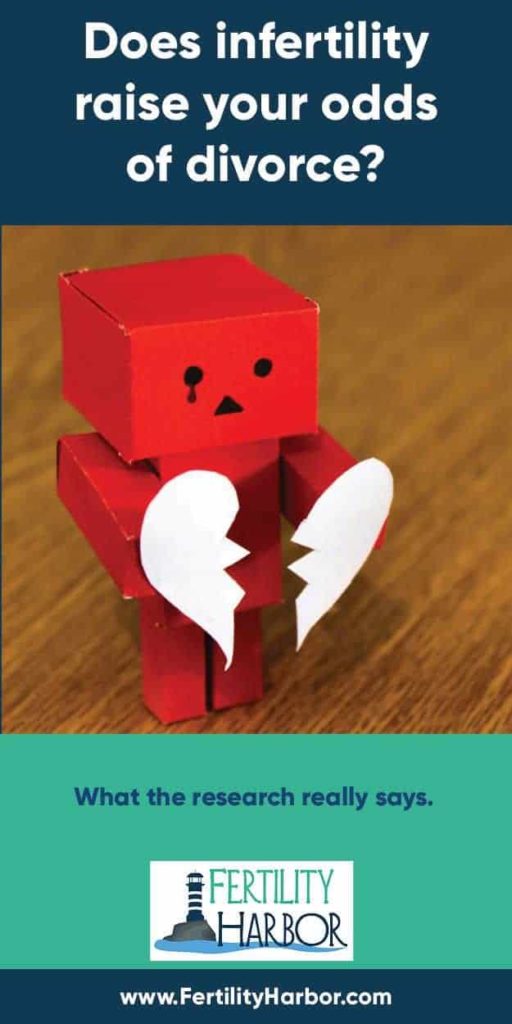This post was reviewed for medical accuracy by Rosalie Gunson, a Certified Registered Nurse Practitioner specializing in fertility care.
When I set out to write this post, I figured I would find evidence that couples dealing with infertility had a statistically higher chance of breaking up. After all, infertility involves a lot of the usual risk factors for divorce, such as stress, depression, and financial pressure. But it turns out that the research is far from clear.
I could find no studies conclusively indicating that experiencing infertility raises the odds of divorce, especially for couples who go on to have a child through fertility treatment or adoption. (The major study that everyone cites mainly found that remaining childless leads to breakups, which is not quite the same thing.)
But infertility does put a significant strain on a relationship, and it’s important to make sure you find healthy ways of managing that stress and keep the lines of communication open.
Research on Infertility and Divorce Rates
Almost all articles on this topic cite a 2014 study from Denmark. I looked into it to find out what exactly the researchers found. Do infertile couples have a higher chance of divorce or not?
The study followed 47,500 infertile couples in Denmark using registry data, which is available because Danish citizens have national ID numbers. (The couples weren’t given questionnaires or interviewed about their relationships.) The researchers looked at whether these couples were still married or co-habitating over a 12-year period after their first infertility evaluation.
The study found that couples who went through infertility treatment but never had a child were up to 3 times more likely to have broken up (divorced or no longer co-habitating), as compared to infertile couples who did have a child.
One drawback of this study is that there is no way to know how solid these marriages were to begin with. The overall divorce rate in Denmark is pretty high, so it’s likely that some of these couples would have broken up regardless. A follow-up study in 2017 found that undergoing IVF did not increase the likelihood of divorce compared to the control group. That’s an encouraging finding!
Let’s not pretend that infertility is easy on relationships, though. Here are some common relationship challenges that you may face on your infertility journey.
Common Relationship Challenges That Infertile Couples Face — and What To Do About Them
Communication Issues
It’s easy to become moody and distracted because you’re thinking about fertility all the time. (And that’s before you start taking hormone shots!)
Any communication problems you and your spouse had before infertility can get worse. What worked before in your regular life may not work when you’re both under stress. Improving your communication will take some effort.
Focus on expressing your feelings and giving your spouse the room to express theirs. If your spouse is opening up to you, make it clear that you’re really listening and taking them seriously. Try not to offer vague platitudes like, “It’ll be OK.” Be specific about what you need to feel supported when you’re discouraged and upset.
Remember that everyone handles uncertainty and grief differently. Do you want your spouse to offer solutions, or would you rather that he just listened to you vent? Don’t assume he’ll be able to read your mind and magically do or say the right thing.
Feelings of Guilt, Shame, Inadequacy, or Resentment
Infertility can bring up a lot of unpleasant emotions, including some you try not to acknowledge — like being resentful of your best friend’s fourth pregnancy. It can also magnify any self-image problems you already had.
Feelings of inadequacy are especially common if the fertility diagnosis is yours rather than your spouse’s. You may feel like you have failed your husband. Women are often told that our bodies are perfectly designed for pregnancy and childbirth, and not achieving something that is supposed to be effortless is discouraging. Many women end up feeling somehow unnatural, broken, or even cursed.
If the fertility issues are on your male partner’s side, chances are he’s already feeling emasculated. He’ll probably have to watch you get a bunch of injections and procedures, even when the fertility issues are all “his fault.” Make sure he knows that you don’t blame him or think he’s less of a man.
Regardless of whose “fault” it is, try to look at your infertility struggle as a tough problem you can solve as a team. Experts call this the perception of joint hardship, and it can actually bring couples closer together.
Sense of Emptiness
Deciding whether to be parents is fundamental to a couple’s vision of their life together. If you always imagined a houseful of children, coming home to just your spouse may start to feel empty — no matter how great your spouse is.
While you are waiting to fill that void with a child, fill it with other things. Try out new hobbies or travel to new places. Go see a movie or a concert together. Give yourselves things on the calendar to look forward to.
This is easier said than done, but it’s better than wallowing on the couch. Besides, if you do have a baby, you’ll have less time and freedom to travel. Take advantage while you can!
Physical Distance
Unfortunately, just when you’re feeling emotionally disconnected from your spouse, you’re also likely to be physically disconnected. Let’s not sugar-coat this: Timed intercourse sucks, and it can ruin your sex life.
All the experts will tell you that it’s important to keep the physical part of your relationship fun. I actually think this is a good reason to consider an IUI, even if it would not be medically indicated in your situation. It helps to take the pressure off the timed intercourse, making it just a back-up.
(Curious about IUIs? Check out my posts How Much Does an IUI Cost Without Insurance? and When to Consider Moving on to Injectable Fertility Meds for more info.)
One way to help with the dreariness of TI is to use lubricant. Make sure you’re not choosing one that could lower the chance of conception, though. It goes without saying that you shouldn’t use lubricants with spermicide (!!!), but even regular lubricants are thought to slow down sperm.
Pre-seed (Amazon link) is a great lubricant that’s specifically made for women trying to get pregnant. And thanks to the magic of the internet, you don’t even have to run to the drugstore to get it! Pro tip: DO NOT use as much as the package recommends. This stuff is really goopy.
Pre-seed is one of the essentials featured in Infertility Starter Pack. Check out that page for more great product recommendations!
Priorities and Timing
Infertility treatment can put other priorities the back burner, for financial reasons as well as logistical ones. It might mean delaying buying a house, starting a business, taking that awesome vacation you’ve been talking about, or aggressively tackling your student loans.
Ideally, you and your spouse would agree on what those priorities are, as well as how long you’re going to try infertility treatments and how you’re going to pay for them.
Some couples struggle with infertility for a very long time. Over the years, your priorities can go in divergent directions. One person may desperately want to keep trying no matter what, but their spouse has accepted the status quo. Or one person may want to pursue adoption or IVF with donor eggs and/ or sperm, but their spouse is adamantly opposed to a baby who is not 100% genetically theirs.
These differences can cause fundamental rifts in a marriage, so it’s important to keep the communication lines open so you know where the other person stands. Both people should feel comfortable sharing any doubts and second thoughts as you go along.
Supporting Your Mental Health During Your Fertility Journey
If you have shared the basics of your fertility struggle with your friends and family, you’ve probably been offered some well-meaning but less-than-totally-helpful advice.
Typically these suggestions involve yoga, essential oils, or “just not thinking about it.” You may even decide to keep your fertility updates to yourself, because it feels kinder than yelling, “AROMATHERAPY ISN’T GOING TO MAKE ME OVULATE!”
So yeah, talking about follicles with people who haven’t been through this can be tricky. But the strain that infertility can put on your mental health and your marriage is even harder to talk about.
This process can be very isolating! If you think it’s time for some professional support, avail yourself of the resources out there.
- Consider going to a support group or a counselor, alone or together. Many larger fertility clinics offer support groups and mental health provider teams for couples to meet 1:1.In some cases, meeting with a mental health provider is actually required before you can move forward. For example, a consultation is often mandatory for anyone using gestational carriers or donor eggs and/ or donor sperm.
- There’s an app for that! Check out Ferticalm. From the website: “FertiCalm provides a variety of more than 500 custom coping options for over 50 specific situations which have the potential to cause distress throughout the family building journey, such as baby functions, relationships, work, fertility treatment, and social events.”
How cool is that?! There’s even a version of this app for men. It’s called Fertistrong. - Don’t assume that you can’t take medication for anxiety or depression while pregnant or trying to become pregnant. Talk to your fertility team if you think you may want to go this route.
My posts 8 Ways for Staying Sane During Infertility/ IVF and Making Room for Secondary Infertility may also be helpful.
Recommended Resources:
- American Society for Reproductive Medicine’s Mental Health Professionals Group.
- Enhancing Your Relationship During Infertility. This is an excellent article by Shady Grove Fertility Center’s director of psychological support services.
This post was last updated in May 2020.




 I’m Jenn! Here I am with my beautiful twin boys. My pregnancy was possible thanks to fertility treatment for PCOS.
I’m Jenn! Here I am with my beautiful twin boys. My pregnancy was possible thanks to fertility treatment for PCOS.


